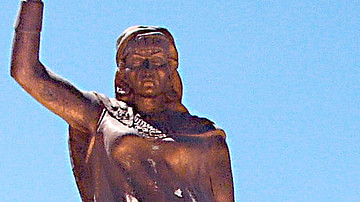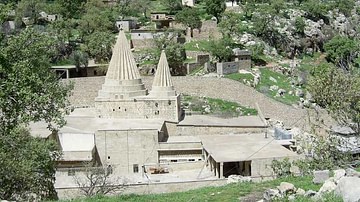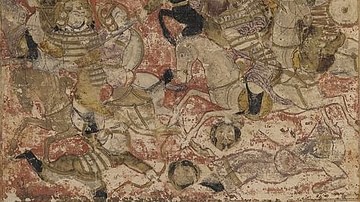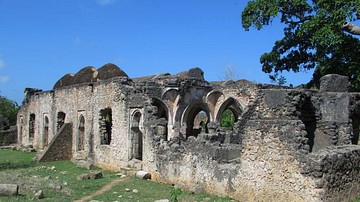Search
Remove Ads
Advertisement
Summary
Loading AI-generated summary based on World History Encyclopedia articles ...
Search Results

Definition
Leo Africanus
Leo Africanus (al-Hasan ibn Muhammad ibn Ahmad al-Wazzan al-Fasi al-Granati, 1485-1554) was a diplomat, merchant traveller and scholar who famously voyaged from Timbuktu to the Niger River and wrote 'The Description of Africa' (La Descrittione...

Definition
Kahina
Kahina (7th century CE) was a Berber (Imazighen) warrior-queen and seer who led her people against the Arab Invasion of North Africa in the 7th century CE. She is also known as al-Kahina, Dihya al-Kahina, Dahlia, Daya, and Dahia-al-Kahina...

Definition
Yazidism
Yazidism is a syncretic, monotheistic religion practiced by the Yazidis, an ethnoreligious group which resides primarily in northern Iraq, northern Syria, and southeastern Turkey. Yazidism is considered by its adherents to be the oldest religion...

Article
Battle of Karbala
The Battle of Karbala (10 October 680 CE) was a small-scaled military engagement, fought near the river Euphrates, in modern-day Iraq, which saw the massacre of heavily outnumbered Alid troops under the command of Husayn ibn Ali (l. 626-680...

Definition
First Fitna
The First Fitna (656-661 CE) was the first civil war of the Islamic Empire fought between the fourth Rashidun Caliph, Ali ibn Abi Talib (656-661 CE), and the governor of Syria, Muawiya (later Muawiya I; r. 661-680 CE). Deep fissures divided...

Definition
Ali ibn Abi Talib
Ali ibn Abi Talib, or simply Ali, (l. 601-661 CE) was among the first Muslims, a cousin and son-in-law of the Islamic Prophet Muhammad (l. 570-632 CE), and later reigned as the fourth Caliph of Islam from 656 CE to 661 CE, when he was murdered...

Article
Wonderful Things: Howard Carter's Discovery of Tutankhamun's Tomb
The great discoverer of the treasures of King Tutankhamun, Howard Carter, was born on May 9, 1874 CE to Samuel John and Martha Joyce (Sands) Carter in Kensington, England. A sick, home-schooled child, Carter learned to draw and paint from...

Definition
Umayyad Dynasty
The Umayyad Dynasty (661-750 CE), the first dynasty to take the title of Caliphate, was established in 661 CE by Muawiya (l. c. 602-680 CE), who had served as the governor of Syria under the Rashidun Caliphate, after the death of the fourth...

Definition
Kilwa
Kilwa, an island located off the coast of East Africa in modern-day southern Tanzania, was the most southern of the major Swahili Coast trading cities that dominated goods coming into and out of Africa from and to Arabia, Persia, and India...

Image
The Travels of Leo Africanus, 1507-1520
This map illustrates North and Sub-Saharan Africa during the 16th century, as described by Johannes Leo Africanus (born al-Hasan ibn Muhammad al-Wazzan al-Fasi, c. 1494–c. 1554) in his 1526 book Cosmographia et Geographia de Africa. This...